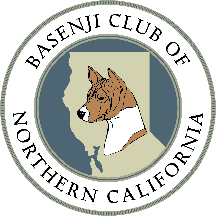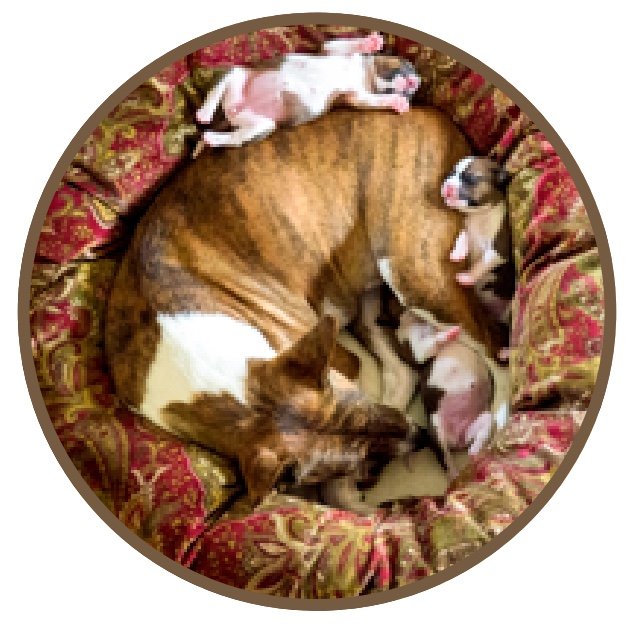How to select a breeder
and recognize red flags
by Lizabeth McCargo
Basenji puppy season will soon begin (if it hasn’t already!). Breeders are finalizing their plans and ensuring their health testing is up to date. They are making lists of potential buyers and continuing the screening process for the perfect homes. Buyers should be getting on waiting lists and contacting breeders now if they haven’t already. Quite often by the time puppies are born, they’re already sold/reserved, so you’ll be waiting a whole year for an opportunity to buy one again.
Basenjis typically come into season once a year, in the fall, so pups are available only once a year. If you haven’t selected a breeder yet, you’re having questions about your breeder, or just want to make sure you’ve made the right choice in your breeder, read on!
RESOURCES FOR FINDING A REPUTABLE BREEDER
Depending on what part of the country you are in, finding a breeder can be challenging, complicated by the proliferation of scammers on social media. Responsible breeders never sell via social media. The scammers offer puppies throughout the year, take your money, but never deliver a puppy to you. The photos of cute puppies are often plagiarized from legitimate breeders or owners. If you are on Facebook, you may want to join Basenji Puppies/Puppys/Puppy’s: Get Educated Before you Buy. It will give you a heads up on known scammers, puppy-millers, and unethical breeders.
However your best step to avoid scammers is to visit the Basenji Club of America (BCOA) for a list of breeders in your state. This list charges members to be listed and it is not exhaustive (there are members who choose not to be listed). Email BCOA Breeder Liaison Denise Vertrees at BridenBasenjis@gmail.com and she will provide you with names/contact information for breeders in your area that may not pay for a BCOA breeder listing.
In addition, there are good breeders who are not members of the BCOA and, as your search continues, you are likely to be referred to them by other breeders who may not have potential pups available.
HEALTH TESTING
Always ask if a breeder has health tests for the mom (dam) and dad (sire). If a breeder says that they are health tested, ask to see the results for the proposed breeding pair. Ask too, for the registered names of the parents. If a breeder does not share the registered names or AKC numbers of the parents, it is a red flag!
The BCOA recommends five tests for breeding animals. Do your own search on the Orthopedic Foundation for Animals (OFA) website— www.ofa.org —and confirm that the registered names/AKC numbers of the sire and dam have passed these tests:
OFA DNA Fanconi Fanconi is a deadly kidney disease and the only certified test is by a DNA saliva swab. Any other form of testing (like urine strips) is false, extremely outdated, and does not have reliable results. Sire and dam at best are both clear for Fanconi or one is clear and the other a carrier.
OFA DNA PRA This test is also a mouth swab or blood DNA test for one form of progressive retinal atrophy (PRA). This progressive form of night blindness often occurs around five–seven years old, but can be younger or older. Sire and dam at best will both clear for PRA or one is clear and the other a carrier.
OFA Hips This test is a simple x-ray that evaluates the hip and socket alignment after age two. The genetic inheritance of hip dysplaysia is unknown. Look for parents with excellent or good results on their x-rays. Because fair is also a passing result, it is advisable check the OFA hip results in the pedigree of the sire and dam. If there are a number of fairs, or no test results, it’s possible that the pair could produce pups with poor or failing hips.
OFA Companion Animal Eye Registry (CAER) exam Look for both sire and dam passing exams on eye disorders including juvenile cataracts, corneal dystrophy, the non-DNA testable version of PRA, and persistent pupillary membranes (PPM). Minor iris to iris PPM will pass, heavy threads or iris to cornea will not.
OFA Thyroid Hypothyroidism is an autoimmune disorder. By the time it is diagnosed it is often too late to reverse the damage. Issues can be severe aggression and mood swings among a long list of other symptoms. Both sire and dam should test clear.
DNA results submitted to the OFA are automatically included in the public domain. For other health tests, the OFA provides owners the choice to report that information in the public domain or not. If you cannot find results on the OFA site, the breeder should be able to send you proof of health testing. Avoid breeders who claim to not have those issues in their lines but can’t back it up with verified health tests. That’s a red flag! Responsible breeders will always try to avoid health conditions being passed to puppies. Breeding however is a roll of the genetic dice and some diseases are multigenetic and not easy to predict. A responsible breeder will want to know if something is wrong.
ASK HOW MANY LITTERS THE BREEDER EXPECTS TO HAVE THIS YEAR
No one wants to support a puppy mill or someone who doesn’t care appropriately for their dogs. Some breeders use a network of homes to help raise puppies, so their litter numbers may be higher than average. A potential red flag is a breeder who has many litters at one time in their home. It’s time consuming to raise one litter and spend adequate time socializing and caring for them—it can be a full time job! A breeder with three, four, or more litters, depending on the number in each litter, is a potential red flag.
VISIT BEFORE COMMITTING
Plan to visit the breeder and meet other Basenjis they have bred. Breeders should be open to sharing their home and kennels with you so you can see how puppies are raised. It is important to know the conditions in which the parents and puppies are raised so that you can be aware of who you are supporting when you purchase a puppy.
Look for breeders who allow the moms to whelp inside their home and are able to help if the birth is going wrong. You may only be able to meet the mother if semen was shipped for the breeding or an outside sire was used. The breeder should still be able to provide photos and information regarding the sire no matter what type of breeding it was. Ask for the registered names and numbers of both the sire and dam.
REGISTRATION
Basenjis in the USA are registered in the American Kennel Club (AKC) and less commonly in the United Kennel Club (UKC). Any other USA based registry is bogus, unethical, disreputable, and designed to trick unsuspecting buyers.
Breeders should provide your puppy’s AKC/UKC registration paperwork upon purchase, or proof of registration paperwork if they are registering the puppies on-line themselves. (Some breeder contracts may state you do not receive paperwork until proof of spay/neuter or other contract terms are met, but these contract terms should be discussed before placing a deposit or paying for the puppy. Ask your breeder about their contract!) Proof of registration should be easily provided, if not, that’s another red flag.
Some puppy buyers claim they don’t care about registration paperwork but it’s critical to preserving the health of Basenjis. Registering a Basenji is the only way to preserve the breed we love and it allows the registries to track and flag potential unethical breeding practices and puppy mills.
CONTRACTS
A reputable breeder will always have a contract. It will include returning the puppy (at any age) to the breeder if you cannot keep it. A contract may also include whether spay/neuter is required; if the puppy will be co-owned with the breeder; if the puppy is required to be shown; if the breeder retains breeding rights.
The contract should include a health guarantee. The return/ replacement of a puppy due to health issues will vary among breeders. Be sure to read the contract to ensure you agree and are satisfied with the health guarantee a breeder offers.
Always ask to see the contract before purchase so you know what you are agreeing to before committing. You should have an opportunity to review contracts before placing a deposit. Contracts are often written in legal terms so you may have questions. Talk to your breeder. If the contract has wording you’re unsure of, don’t understand, or don’t feel comfortable with, talk to your breeder about it. Quite often a simple explanation can put all minds at ease. If they give you a hard time or you don’t feel comfortable, go with someone else. It’s important to have a good working relationship with your breeder built on trust, with open lines of communication and mutual respect.
PUPPY PRICES
Basenjis from reputable breeders can run $1,500-$2,500 depending on geographic location, transportation costs, and additional items that may come with the puppy.
Beware of anyone offering a puppy substantially lower or higher. They could be legitimate but ask why their prices differ from the norm. Walk away if the breeder claims the price is based on a rare coat color—there are no accepted rare colors.
Remember this initial cost is an investment in the health and longevity of life for your Basenji. When purchasing a purebred dog, the price very rarely correlates with quality/health.
QUESTIONS AFTER YOU HAVE YOUR PUP
Your breeder should always be your first resource for questions and concerns. Facebook groups and dog forums are fun but your breeder knows their puppies, knows their lines, and will likely have better and more reliable answers for your questions.
Turn to your vet for health issues that your breeder can’t assist you with. You’ll get better advice from them than Dr. Google or social media. Do share the treatment and results on-line—it may inspire another person to get their dog medical help.
And please, don’t forget your breeder after you take your puppy home! Breeders love pictures and updates. They will always be loved by us too!
With this information on your radar, a well bred, happy, healthy, and well adjusted Basenji puppy who shouldn’t need much more than routine medical care is likely to become your best friend.
Want more information about Basenjis in general? The BCOA website is an amazing resource with tons of info and history about the Basenji. Check out their Basenji University too!
For a downloadable/pdf version of this article, see this link.









